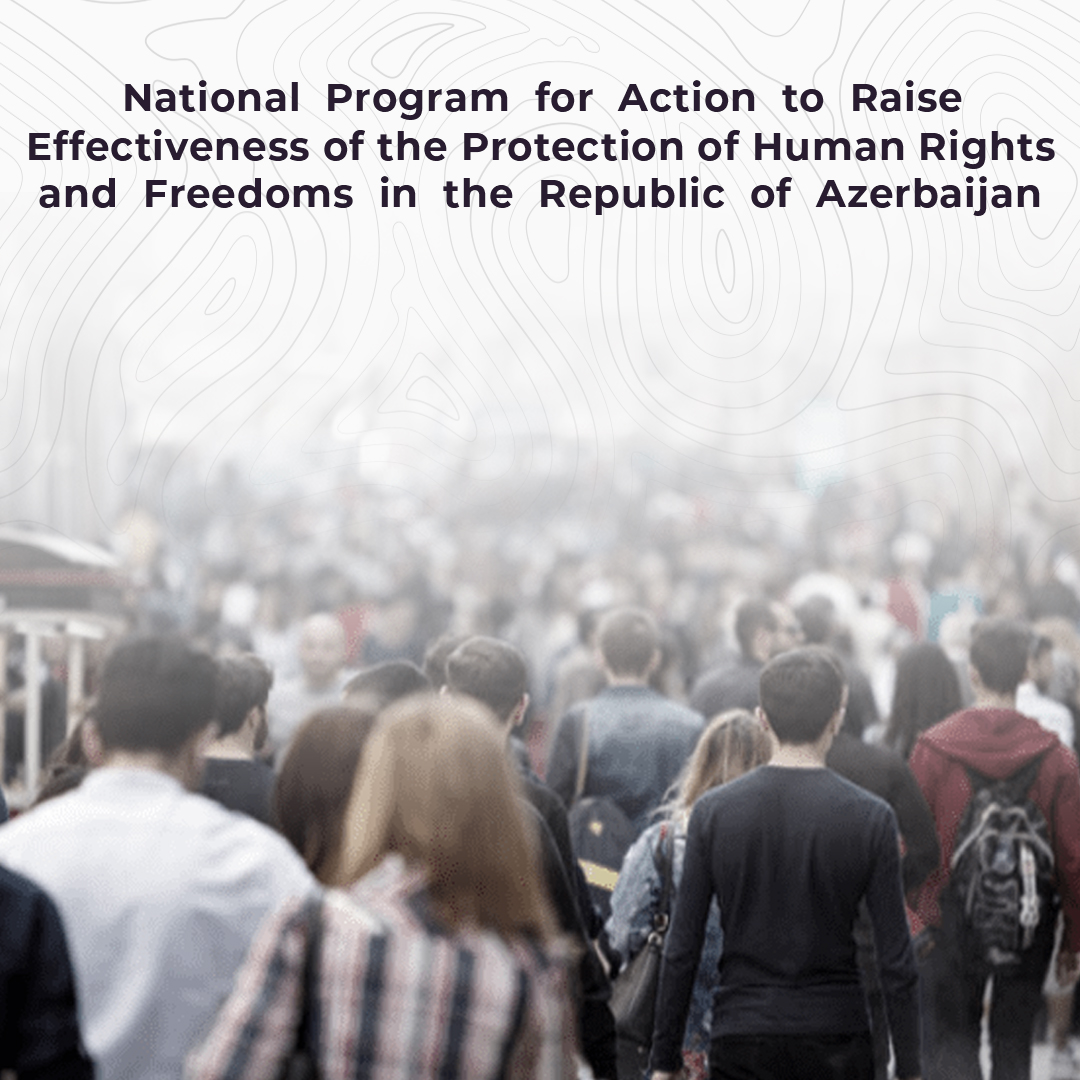
- Home page
- Commissioner
-
Activity Directions
- Mental Health and Human Rights
- Protection of the Rights of Population Groups
- Protection of the Right to Information
- Independent Monitoring Mechanism
- Legal Education
-
International Cooperation
- Cooperation with international organizations
- Cooperation with non-governmental organizations
- Study visits
- Projects
- Statements addressed to the international organizations
- “Ad hoc” reports
- Parallel and alternative reports submitted to the UN Treaty Bodies
- Oral and written statements submitted to the UN Human Rights Council
- Memorandums of cooperation
- Baku Declarations of Ombudspersons
- International Baku Forum
- Scientific Analytical Work
- Cooperation with Public and Civil Society Organizations
- Business and Human Rights
- National Preventive Mechanism Against Torture
- Protection of Human Rights
- Documents
- Media
- Live
- Contact
- Home page
- Commissioner
-
Activity Directions
- Mental Health and Human Rights
- Protection of the Rights of Population Groups
- Protection of the Right to Information
- Independent Monitoring Mechanism
- Legal Education
-
International Cooperation
- Cooperation with international organizations
- Cooperation with non-governmental organizations
- Study visits
- Projects
- Statements addressed to the international organizations
- “Ad hoc” reports
- Parallel and alternative reports submitted to the UN Treaty Bodies
- Oral and written statements submitted to the UN Human Rights Council
- Memorandums of cooperation
- Baku Declarations of Ombudspersons
- International Baku Forum
- Scientific Analytical Work
- Cooperation with Public and Civil Society Organizations
- Business and Human Rights
- National Preventive Mechanism Against Torture
- Protection of Human Rights
- Documents
- Media
- Live
- Contact
Call center
916
Head of Ombudsman Office attended conference in Helsinki on "Impacts of artificial intelligence development on human rights, democracy and the rule of law"
A high-level conference on the topic of “Impacts of artificial intelligence development on human rights, democracy and the rule of law” was held in the capital of Finland, Helsinki. The conference took place on February 26-27, 2019 and was organized by the Finnish government and Council of Europe (CoE) within the framework of the Finnish Chairmanship of the Committee of Ministers.
The event was attended by the Secretary-General of the CoE Thorbjorn Jagland, the Commissioner for Human Rights of the CoE, the UN Special Rapporteur on Freedom of Opinion and Expression David Kaye, the Minister of Foreign Affairs of Finland Timo Soini, the Minister of Justice of France Nicole Belloubet, officials of relevant authorities of other European countries, international and regional organizations, high-ranking representatives of Facebook, Google, Microsoft companies, judges of the European Court of Human Rights, well-known scholars and experts specialized in information technologies (IT) and law.
Aydin Safikhanly, the Head of Office of the Commissioner for Human Rights (Ombudsman) of the Republic of Azerbaijan, also took part in the conference.
Discussions were held within three sessions covering the impacts of artificial intelligence (AI) on human rights, democracy and the rule of law.
On the first day, issues related to the impact of AI (robots) on the human rights and democracy were discussed. A.Safikhanly made a speech and said that formation of E-government and provision of its efficient activity became one of the factors influencing the development of democracy, formation of E-government is based on the international practice and relevant legal basis was established. The State Agency for Public Service and Social Innovations under the President of the Republic of Azerbaijan closely cooperates with other state bodies on the development of E-government, operates for creating relevant infrastructure as the coordinator of these activities.
He underlined that National Certification Services Center was established for the use of electron signatures, infrastructure providing data exchange among information systems of state bodies was built, “E-Government” portal was developed and launched, all the state bodies benefited from that in guaranteeing provision of electron services to the citizens and thus contributed protection of human rights.
During the speech he also mentioned about the visit of the first AI humanoid robot Sophia to Azerbaijan that was introduced the country President within the inauguration of the “ASAN Life” complex, Sophia’s positive reaction in regard of her acquaintance with ASAN Service, stating its convenience, modernity and citizen-oriented nature, also her activity as a volunteer of this Service and participation in getting feedback from the citizens.
A.Safikhanly noted that online application service to the Azerbaijani Ombudsman has been integrated to the E-government portal and is actively used by the population.
The second day of the conference included the session discussing the impact of AI on the rule of law. In his speech, the head of the Office applied to the panelists with the question on the possibility of involving AI to the investigation process of criminal cases, especially the crimes against peace and humanity. He stressed upon that the necessity for such a question arose from the application of double standards against Azerbaijan for a long period of time, not conducting the legal assessment of international crimes against Azerbaijan, impunity of persons who committed such crimes. He informed the conference attendees broadly about the Khojaly genocide, also the nationwide march held in Baku with the participation of the President and more than 55, 000 Azerbaijanis regarding the 27th anniversary of the Khojaly genocide, where the main slogans were “The world should recognize Khojaly genocide!”, “Justice for Khojaly!”.
It was noted that various international organizations were appealed on that issue during 27 years, more than 10 states and 22 States of the USA have recognized the Khojaly events, but not all the countries take such a step because of the double standards and political interests. Thus, the will on involvement of AI techniques to the solution of problem is caused by the unjust position demonstrated by some people working in the authorized organizations which are competent in this field.
- National preventive mechanism against torture
- Protection of the rights of population groups
- Protection of the rights of refugees, IDPs and migrants
- Protection of the rights of detainees and prisoners
- Protection of the rights of military servants
- Protection of women's rights and provision of gender equality
- Protection of child rights
- General
- Legal awareness
- Protection of the rights of older people
- Protection of the rights of persons with disabilities
- Cooperation with public and civil society
- National preventive mechanism against torture
- International cooperation
- Non-Governmental Organizations
- Public hearings
- Mass media
- Business and Human Rights
- Protection of the rights of martyrs' families and war veterans
- Protection of the rights of migrants
- Prevention of discrimination and ensuring equality
- Right to information
- Mental health
- .
-

- The Ombudsman participated in the International Conference on “Artificial Intelligence and Human Rights: Opportunities, Risks and Visions for a Better Future” in Qatar.
-

- The Ombudsman sent letter to UN High Commissioner for Refugees regarding protection of rights of persons deported from Armenia.
-

- A representative of the Ombudsman Office took part in an event organized by the Ministry of Energy.
-

- The Ombudsman’s representatives participated in the Pardon Decree Enforcement Ceremony.
-

- A series of legal awareness events were organized by the Ombudsman's Regional Centers.
-




